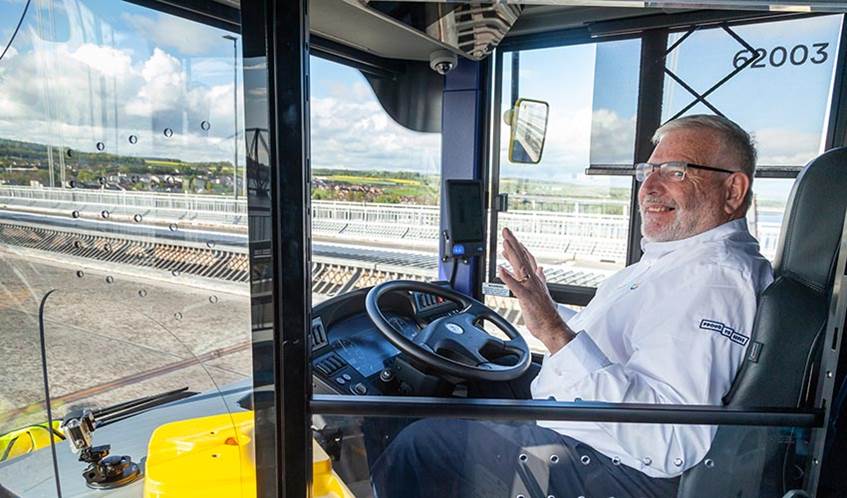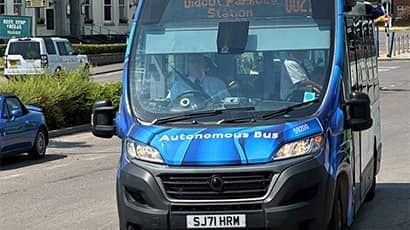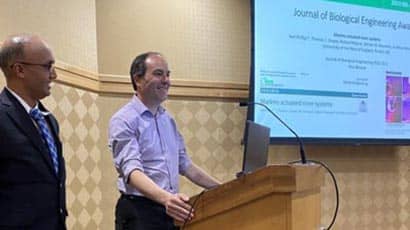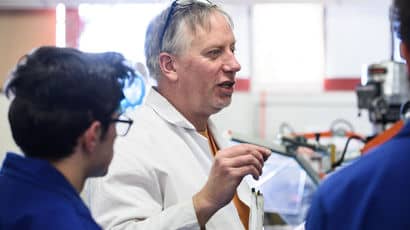Autonomous bus service launches as part of project assisted by Bristol Robotics Laboratory

One of most ambitious and complex autonomous bus services worldwide has been launched on the Forth Road Bridge near Edinburgh.
The CAVForth project is led by Fusion Processing Ltd, based at Future Space on UWE Bristol’s Frenchay campus, in cooperation with project partners Stagecoach, Transport Scotland, Alexander Dennis, Edinburgh Napier University and Bristol Robotics Laboratory. It is co-funded by the UK Government’s Centre for Connected and Autonomous Vehicles.
From 15th May 2023, the project’s fleet of five autonomous buses will operate a scheduled passenger service seven days a week on the new AB1 route. It has the capacity to carry up to 10,000 passengers per week.
The 14-mile route crosses the Forth Road Bridge and is made up of A-roads, motorways, bus lanes and private land. It includes a range of complex traffic manoeuvres such as roundabouts, traffic lights, and ‘weaving’ motorway lane changes. The vehicles will travel in mixed traffic up to 50mph.
The buses use Fusion Processing’s autonomous drive system, CAVStar, which utilises data from a suite of state-of-the-art sensors including cameras, LiDAR and radar together with artificial intelligence processing to deliver optimum efficiency throughout the journey, in all traffic conditions. In addition, receiving information directly from traffic light systems enables the bus to plan its speed to run smoothly run from one green light to the next.
This intelligent autonomous driving reduces unnecessary braking and accelerating, contributing to less wear on brakes and tyres, with corresponding reductions in particulate emissions.
CAVForth operates at the highest level of autonomous vehicle technology currently permissible on public roads, SAE Level 4, requiring the buses to retain a safety driver. Some 20 autonomous bus professionals have been recruited from Stagecoach East Scotland’s existing driving team.
To support the project’s extensive research on passenger and public acceptance of autonomous vehicle technology, a second autonomous bus professional will act as bus captain, moving freely around the vehicle to engage with customers. This demonstrates what a future autonomous service could feel like when a single bus ‘captain’ can leave the cab while the computer does the driving.
Anthony Pipe, Professor of Robotics and Autonomous Systems at the Bristol Robotics Laboratory, said: “Bristol Robotics Laboratory is very proud to be involved in this ground-breaking project, which is taking a world-lead on advanced automation for the public service vehicle sector. The short-term benefits of vehicle autonomy in providing safer and more energy efficient travel will be illustrated by this project and, in the longer term, we believe that it will contribute significantly to transformations in the way we achieve mobility in our society.”
Minister for Transport for Scotland, Kevin Stewart, said: “It is really exciting to see the innovative and ambitious CAVForth project take to the roads in earnest after all the hard work of the partner organisations involved in bringing this world first to Scotland. We want Scotland to continue to be at the forefront in the development of Connected and Autonomous Vehicles and the start of this live trial will really help the country establish its credentials on the world stage. I am excited to see how this technology can help to support our vision for a sustainable, inclusive, safe and accessible transport system.”
Jim Hutchinson, Fusion Processing CEO, said: “CAVForth is an exciting showcase of how our CAVstar® Automated Drive System can safely operate in a very complex driving environment. This pilot is globally significant and marks a step change in the operation of autonomous commercial vehicles on public roads.”
Related news

14 June 2023
Researchers monitor autonomous bus user experience as UK's first zero emission service launches new route
Researchers monitor autonomous bus user experience as UK's first zero emission service launches new route.

15 May 2023
Algae ball research recognised with international biological engineering award
Research that demonstrates how balls of algae can be transformed into eco-friendly underwater robots has been recognised with a prestigious award.
You may also be interested in

Media enquiries
Enquiries related to news releases and press and contacts for the media team.

Find an expert
Media contacts are invited to check out the vast range of subjects where UWE Bristol can offer up expert commentary.

We're creating tomorrow, today. RISE
Collaborating with industry, public sector bodies and communities, we’re redefining horizons and challenging conventions to impact lives positively.






